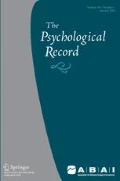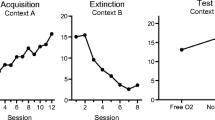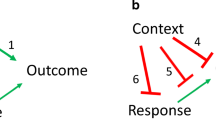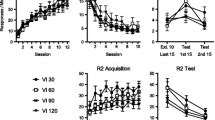Abstract
The present free operant conditioning experiments with rats examined the impact of manipulating different traits of an extinction-cue on ABA renewal. All rats were trained to perform an operant response (R1) for food in context A, and a different operant response (R2) in context B. Responses were then extinguished, R1 in context B and R2 in context A. In Experiment 1, for half of the rats, both responses were extinguished in the presence of an intermittent light. For the other half, a continuous light was utilized during extinction of R1 and R2. Finally, all rats were tested in both contexts (R1 was tested in the presence of the cue in both contexts, whereas R2 was tested in the presence of the cue only in the extinction context). Returning the rats to the original conditioning context renewed the initial operant behavior. However, we found that both types of extinction-cues (intermittent and continuous) attenuated ABA renewal equally. In addition, both responses underwent extinction in Experiment 2. For half of the subjects, R1 and R2 were extinguished in the presence of a dim light, whereas the other half received a bright light as an extinction-cue for both responses. Once again, we found during testing (R1 was tested in the presence of the cue in both contexts whereas R2 was tested in the presence of the cue only in the extinction context), that both types of extinction-cues reduced ABA renewal in a similar manner. The present results suggest that in some conditions, the features of the extinction cues may not affect their renewal-attenuating properties.




Similar content being viewed by others
References
Bernal-Gamboa, R., Gámez, A. M., & Nieto, J. (2018). Spacing extinctions sessions as a behavioral technique for preventing relapse in an animal model of voluntary actions. Behavioural Processes, 151, 54–61. https://doi.org/10.1016/j.beproc.2018.01.021.
Bernal-Gamboa, R., & Nieto, J. (2018). Evidence of ABC instrumental renewal formerly eliminated by extinction and omission procedures. Revista Argentina de Ciencias del Comportamiento, 10, 11–18.
Bernal-Gamboa, R., Nieto, J., & Uengoer, M. (2017). Effects of extinction in multiple contexts on renewal of instrumental responses. Behavioural Processes, 142, 64–69. https://doi.org/10.1016/j.beproc.2017.06.003.
Bouton, M. E. (2014). Why behavior change is difficult to sustain. Preventive Medicine, 68, 29–36. https://doi.org/10.1016/j.ypmed.2014.06.010.
Bouton, M. E. (2019). Extinction of instrumental (operant) learning: Interference, varieties of context, and mechanisms of contextual control. Psychopharmacology, 236, 7–19. https://doi.org/10.1007/s00213-018-5076-4.
Bouton, M. E., & Schepers, S. T. (2015). Renewal after the punishment of free operant behavior. Journal of Experimental Psychology: Animal Learning & Cognition, 41, 81–90. https://doi.org/10.1037/xan0000051.
Bouton, M. E., & Todd, T. P. (2014). A fundamental role for context in instrumental learning and extinction. Behavioural Processes, 104, 13–19. https://doi.org/10.1016/j.beproc.2014.02.012.
Bouton, M. E., Todd, T. P., Vurbic, D., & Winterbauer, N. (2011). Renewal after the extinction of free operant behavior. Learning & Behavior, 39, 57–67. https://doi.org/10.3758/s13420-011-0018-6.
Bouton, M. E., Winterbauer, N. E., & Todd, T. P. (2012). Relapse processes after the extinction of instrumental learning: Renewal, resurgence, and reacquisition. Behavioural Processes, 90, 130–141. https://doi.org/10.1016/j.beproc.2012.03.004.
Bouton, M. E., Woods, A. M., Moody, E. W., Sunsay, C., & García-Gutiérrez, A. (2006). Counteracting the context-dependence of extinction: Relapse and tests of some relapse prevention methods. In M. G. Craske, D. Hermans, & D. Vansteenwegen (Eds.), Fear and learning: From basic processes to clinical implications (pp. 175–196). American Psychological Association.
Brooks, D. C. (2000). Recent and remote extinction cues reduce spontaneous recovery. Quarterly Journal of Experimental Psychology Section B, 53(1b), 25–58. https://doi.org/10.1080/713932714.
Brooks, D. C., & Bouton, M. E. (1994). A retrieval cue for extinction attenuates response recovery (renewal) caused by a return to the conditioning context. Journal of Experimental Psychology: Animal Behavior Processes, 20, 366–379.
Dibbets, P., Havermans, R., & Arntz, A. (2008). All we need is a cue to remember: The effect of an extinction cue on renewal. Behaviour Research and Therapy, 46, 1070–1077. https://doi.org/10.1016/j.brat.2008.05.007.
Fisher, W. W., Greer, B. D., Fuhrman, A. M., & Querim, A. C. (2015). Using multiple schedules during functional communication training to promote rapid transfer of treatment effects. Journal of Applied Behavior Analysis, 48, 713–733. https://doi.org/10.1002/jaba.254.
Gámez, A. M., & Bernal-Gamboa, R. (2019). The reoccurrence of voluntary behavior in humans is reduced by retrieval cues from extinction. Acta Psychologica, 200, 1–7. https://doi.org/10.1016/j.actpsy.2019.102945.
Ibañez, V. F., Piazza, C. C., & Peterson, K. M. (2019). A translational evaluation of renewal of inappropriate mealtime behavior. Journal of Applied Behavior Analysis, 52, 1005–1020. https://doi.org/10.1002/jaba.647.
Kelley, M. E., Jimenez-Gomez, C., Podlesnik, C. A., & Morgan, A. (2018). Evaluation of renewal mitigation of negatively reinforced socially significant operant behavior. Learning & Motivation, 63, 133–141. https://doi.org/10.1016/j.lmot.2018.05.003.
Kelley, M. E., Liddon, C. J., Ribeiro, A., Greif, A. E., & Podlesnik, C. A. (2015). Basic and translational evaluation of renewal of operant responding. Journal of Applied Behavioral Analysis, 48, 390–401. https://doi.org/10.1002/jaba.209.
Marchant, N. J., Li, X., & Shaham, Y. (2013). Recent developments in animal models of drug relapse. Current Opinion in Neurobiology, 23, 675–683. https://doi.org/10.1016/j.conb.2013.01.003.
McLaren, I. P. L., & Mackintosh, N. J. (2000). An elemental model of associative learning: I. Latent inhibition and perceptual learning. Animal Learning & Behavior, 28, 211–246. https://doi.org/10.3758/BF03200258.
Moos, R. H., & Moos, B. S. (2006). Rates and predictors of relapse after natural and treated remission from alcohol use disorders. Addiction, 101, 212–222. https://doi.org/10.1111/j.1360-0443.2006.01310.x.
Nakajima, S., Tanaka, S., Urushihara, K., & Imada, H. (2000). Renewal of extinguished lever-press responses upon return to the training context. Learning & Motivation, 31, 416–431. https://doi.org/10.1006/lmot.2000.1064.
Nakajima, S., Urushihara, K., & Masaki, T. (2002). Renewal of operant performance formerly eliminated by omission or noncontingency training upon return to the acquisition context. Learning & Motivation, 33, 510–525. https://doi.org/10.1016/S0023-9690(02)00009-7.
Nelson, J. B. (2016). A robust function to return the cumulative density of non-central F distributions in Microsoft Office Excel. Psicológica, 37, 61–83.
Nieto, J., Mason, T. A., Bernal-Gamboa, R., & Uengoer, M. (2020). The impacts of acquisition and extinction cues on ABC renewal of voluntary behaviors. Learning & Memory, 27, 114–118. https://doi.org/10.1101/lm.050831.119.
Nieto, J., Uengoer, M., & Bernal-Gamboa, R. (2017). A reminder of extinction reduces relapse in an animal model of voluntary behavior. Learning & Memory, 24, 76–80. https://doi.org/10.1101/lm.044495.116.
Podlesnik, C. A., Kelley, M. E., Jimenez-Gomez, C., & Bouton, M. E. (2017). Renewed behavior produced by context change and its implications for treatment maintenance: A review. Journal of Applied Behavior Analysis, 50, 675–697. https://doi.org/10.1002/jaba.400.
Pritchard, D., Hoerger, M., & Mace, F. C. (2014). Treatment relapse and behavioral momentum theory. Journal of Applied Behavior Analysis, 47, 814–833. https://doi.org/10.1002/jaba.163.
Rey, C. N., Thrailkill, E. A., Goldberg, K., & Bouton, M. E. (2020). Relapse of an operant behavior after response elimination with an extinction or an omission contingency. Journal of the Experimental Analysis of Behavior, 113, 124–140. https://doi.org/10.1002/jeab.568.
Rosenthal, M. Z., & Kutlu, M. G. (2014). Translation of associative learning models into extinction reminders delivered via mobile phones during cue exposure interventions for substance use. Psychology of Addictive Behaviors, 28, 863–871. https://doi.org/10.1037/a0037082.
Todd, T. P. (2013). Mechanisms of renewal after the extinction of instrumental behavior. Journal of Experimental Psychology: Animal Behavior Processes, 39, 193–207. https://doi.org/10.1037/a0032236.
Todd, T. P., Vurbic, D., & Bouton, M. E. (2014). Behavioral and neurobiological mechanisms of extinction in Pavlovian and instrumental learning. Neurobiology of Learning & Memory, 108, 52–64. https://doi.org/10.1016/j.nlm.2013.08.012.
Todd, T. P., Winterbauer, N. E., & Bouton, M. E. (2012). Effects of the amount of acquisition and contextual generalization on the renewal of instrumental behavior after extinction. Learning & Behavior, 40, 145–157. https://doi.org/10.3758/s13420-011-0051-5.
Trask, S. (2019). Cues associated with alternative reinforcement during extinction can attenuate resurgence of an extinguished instrumental response. Learning & Behavior, 47, 66–79. https://doi.org/10.3758/s13420-018-0339-9.
Trask, S., & Bouton, M. E. (2016). Discriminative properties of the reinforcer can be used to attenuate the renewal of extinguished operant behavior. Learning & Behavior, 44, 151–161. https://doi.org/10.3758/s13420-015-0195-9.
Wathen, S. N., & Podlesnik, C. A. (2018). Laboratory models of treatment relapse and mitigation techniques. Behavior Analysis: Research & Practice, 18, 362–387. https://doi.org/10.1037/bar0000119.
Willcocks, A. L., & McNally, G. P. (2014). An extinction retrieval cue attenuates renewal but not reacquisition of alcohol seeking. Behavioral Neuroscience, 128, 83–91. https://doi.org/10.1037/a0035595.
Availability of Data and Materials
The datasets generated during and analyzed in the current study are available from the corresponding author on request.
Funding
This research was funded by UNAM/DGAPA through grant project PAPIIT IN306817. Participation of A. M. Gámez was funded by Grant PGC2018-097769-B-C22 from the Spanish Ministry of Science, Innovation, and Universities and by Junta de Andalucía, Spain, Research Grant HUM642.
Author information
Authors and Affiliations
Corresponding author
Ethics declarations
Conflicts of Interest
On behalf of all authors, the corresponding author states that there are no conflicts of interest.
Ethical Approval
The present experimental protocol was conducted under strict agreement with the guidelines established by the Ethical Committee of the Faculty of Psychology of the National University of Mexico and the Ethical Code of the Mexican Society of Psychology.
Additional information
Publisher’s Note
Springer Nature remains neutral with regard to jurisdictional claims in published maps and institutional affiliations.
Rights and permissions
About this article
Cite this article
Bernal-Gamboa, R., Mason, T.A., Nieto, J. et al. An Analysis of Extinction-Cue Features in the Reduction of Operant Behavior Relapse. Psychol Rec 72, 65–73 (2022). https://doi.org/10.1007/s40732-021-00472-z
Accepted:
Published:
Issue Date:
DOI: https://doi.org/10.1007/s40732-021-00472-z




